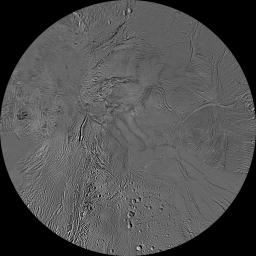
|
The Southern Hemisphere of Enceladus
- Click the image above for a larger view
- Full-Res JPEG (9159 x 9159) (6.5 MB)
- Full-Res TIFF (9159 x 9159) (83.9 MB)
Caption:
This updated mosaic of the southern hemisphere of Saturn's moon Enceladus has been constructed from the many high-resolution images (less than 1 kilometer per pixel, or 0.6 mile per pixel) acquired by NASA's Cassini spacecraft, imaging science sub-system during four close targeted flybys of Enceladus in March, August and October 2008.
Crater Salih, which defines the longitude system of Enceladus, was observed with high resolution during the March 2008 close flyby, allowing improvement in the mosaic's longitude system. The global mosaic has been shifted 3.5 degrees to the west to be consistent with the longitude definition given by the International Astronomical Union. For the Enceladus image atlas, see PIA08419 .
Background Info:
The Cassini-Huygens mission is a cooperative project of NASA, the European Space Agency and the Italian Space Agency. The Jet Propulsion Laboratory, a division of the California Institute of Technology in Pasadena, manages the mission for NASA's Science Mission Directorate, Washington, D.C. The Cassini orbiter and its two onboard cameras were designed, developed and assembled at JPL. The imaging operations center is based at the Space Science Institute in Boulder, Colo.
For more information about the Cassini-Huygens mission visit http://saturn.jpl.nasa.gov/ . The Cassini imaging team homepage is at http://ciclops.org .
Cataloging Keywords:
| Name | Value | Additional Values |
|---|---|---|
| Target | Enceladus | |
| System | Saturn | |
| Target Type | Satellite | |
| Mission | Cassini-Huygens | |
| Instrument Host | Cassini Orbiter | |
| Host Type | Orbiter | |
| Instrument | Imaging Science Subsystem (ISS) | |
| Detector | ||
| Extra Keywords | Crater, Grayscale | |
| Acquisition Date | ||
| Release Date | 2008-12-15 | |
| Date in Caption | ||
| Image Credit | NASA/JPL/Space Science Institute | |
| Source | photojournal.jpl.nasa.gov/catalog/PIA11126 | |
| Identifier | PIA11126 | |
